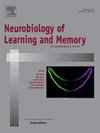The mechanisms of memory traces storage and interaction in snails: Role of DNA methylation and protein synthesis
IF 1.8
4区 心理学
Q3 BEHAVIORAL SCIENCES
引用次数: 0
Abstract
Understanding the molecular mechanisms underlying the storage and interaction of different memory traces remains an important, yet underexplored, topic in neurobiology. We addressed this using grape snails trained to reject two food-conditioned stimuli (CS). Our results indicate that memory storage mechanisms for distinct CS are independent, as selective impairment of memory reconsolidation with an NMDA receptor antagonist affected only one CS. When both CS reconsolidations were simultaneously disrupted, the snails developed amnesia, which manifested as anterograde amnesia on late amnesia stage, where repeated training failed to induce long-term memory formation. Intriguingly, shortened retraining in the presence of a DNA methyltransferase (DNMT) inhibitor facilitated memory recovery for one CS while preserving amnesia for the other, suggesting that latent memory traces are maintained via DNA methylation. Moreover, training to new food type aversion under a DNMT inhibitor induced spontaneous memory recovery for an old CS memory, which was tested the next day after training. This recovery did not occur during new training in the absence of the DNMT inhibitor. It was also found that a protein synthesis inhibitor administered before new training suppressed the restoration of old memory, whereas an inhibitor administered after new training, but not before it, prevented the formation of new memory. These findings demonstrate that independent molecular and epigenetic mechanisms preserve memory traces within the same neuronal ensemble and that new information can reactivate latent memories through specific protein synthesis and DNA methylation processes, offering fresh insights into memory storage and reconsolidation.
蜗牛记忆痕迹储存和相互作用的机制:DNA甲基化和蛋白质合成的作用。
了解不同记忆痕迹的存储和相互作用的分子机制仍然是神经生物学中一个重要但尚未充分探索的话题。我们通过训练葡萄蜗牛来拒绝两种食物条件刺激(CS)来解决这个问题。我们的研究结果表明,不同CS的记忆存储机制是独立的,因为NMDA受体拮抗剂对记忆再巩固的选择性损伤仅影响一种CS。当两种CS再巩固同时被破坏时,蜗牛出现健忘症,表现为健忘症晚期的顺行性健忘症,反复训练无法诱导长期记忆的形成。有趣的是,在DNA甲基化酶(DNMT)抑制剂的存在下,缩短再训练有助于一个CS的记忆恢复,同时保持另一个CS的健健性,这表明潜在的记忆痕迹是通过DNA甲基化维持的。此外,在DNMT抑制剂下对新食物类型厌恶的训练诱导了对旧CS记忆的自发记忆恢复,这在训练后的第二天进行了测试。在缺乏DNMT抑制剂的新训练中,这种恢复没有发生。研究还发现,在新训练之前使用的蛋白质合成抑制剂抑制了旧记忆的恢复,而在新训练之后使用的抑制剂则阻止了新记忆的形成。这些发现表明,独立的分子和表观遗传机制在相同的神经元集合中保留了记忆痕迹,新的信息可以通过特定的蛋白质合成和DNA甲基化过程重新激活潜在的记忆,为记忆存储和再巩固提供了新的见解。
本文章由计算机程序翻译,如有差异,请以英文原文为准。
求助全文
约1分钟内获得全文
求助全文
来源期刊
CiteScore
5.10
自引率
7.40%
发文量
77
审稿时长
12.6 weeks
期刊介绍:
Neurobiology of Learning and Memory publishes articles examining the neurobiological mechanisms underlying learning and memory at all levels of analysis ranging from molecular biology to synaptic and neural plasticity and behavior. We are especially interested in manuscripts that examine the neural circuits and molecular mechanisms underlying learning, memory and plasticity in both experimental animals and human subjects.

 求助内容:
求助内容: 应助结果提醒方式:
应助结果提醒方式:


